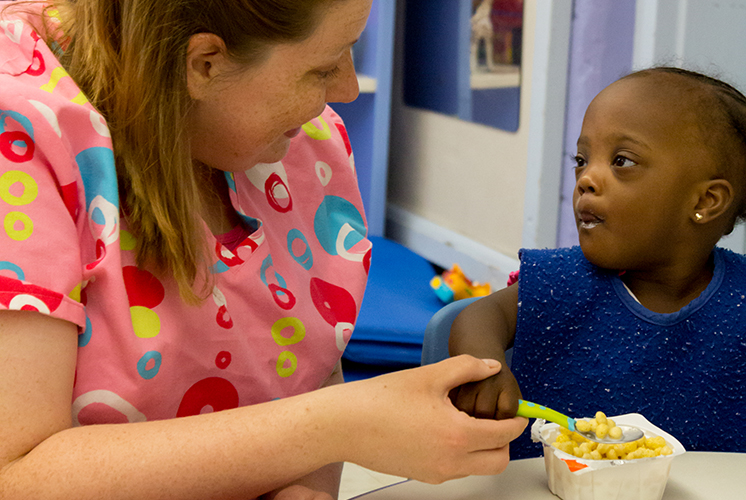 Effective interactional practices are engaging, sensitive, and responsive to children’s developmental, cultural, and linguistic backgrounds. This is especially important for children at risk for or diagnosed with disabilities.
Effective interactional practices are engaging, sensitive, and responsive to children’s developmental, cultural, and linguistic backgrounds. This is especially important for children at risk for or diagnosed with disabilities.
These practices are aligned with the Head Start Early Learning Outcomes Framework (ELOF) in the following domains: Approaches to Learning, Social and Emotional Development, Language and Communication, and Cognition. Learn more about recommended practices related to interaction from the Division for Early Childhood (DEC).
Resources are organized based on their level of impact for learning, and are only a sampling of the resources available on these practices.
Knowledge Awareness Level
Resources that fall into this category provide basic information and do not include activities that draw participants in to respond or reflect. They include archived webinars and checklists.
Adult Support
This in-service suite presents adult support strategies that can be used to increase the participation of children who need more support or challenge. Links to supporting materials are provided, including tips, tools, and resources for teachers, supervisors, and trainers.
Center on the Social and Emotional Foundations for Early Learning (CSEFEL): What Works Briefs
Explore effective strategies and practices that support children's social and emotional development and interactions. Staff can share these briefs with family members as "how-to" guides or to promote discussion. Each guide includes examples, vignettes, and additional resources and materials.
How Teachers and Parents Can Accommodate for a Child’s Temporary or Permanent Hearing Loss
Find information, strategies, and tips for how parents and teachers can minimize the negative consequences of hearing loss by creating an optimal language-listening environment.
Peer Support
Discover strategies for using peer support to increase the participation of children who need more support or challenge. See examples of what the strategies look like in the classroom. Supporting materials include tips for teachers and supervisors, helpful resources, and in-service suite materials for trainers.
Knowledge Acquisition Level
Resources in this category provide information and include activities that draw participants in to respond or reflect.
15-minute Inclusion In-service Overview
Read a brief overview about the 15-minute in-service resources designed to help Head Start programs include children with disabilities in their classroom and other programs.
Activity Matrix: Organizing Learning Throughout the Day
This in-service suite introduces the Activity Matrix as an effective tool teachers can use to organize learning opportunities for children who need additional support during daily classroom activities and routines. Examples of how the matrix can be used with children’s individual learning goals are shared. Supporting materials for teachers, supervisors, and trainers include tips, tools, and helpful resources.
Early Childhood Behavior Management: Developing and Teaching Rules
Discover how to create developmentally appropriate behavior rules for early childhood classrooms with this IRIS module. Walk through a challenge observed in the classroom, explore ways to overcome the challenge, and communicate with families. Find additional resources and a self-assessment to evaluate your understanding of the topic.
Highly Individualized Teaching and Learning: An Overview
This short video and supporting materials introduce the levels of individualization that may be appropriate for children with diverse strengths and needs. The video briefly describes three ways that staff can individualize their teaching to support by making simple modifications, providing many embedded learning opportunities, and using more intensive teaching practices. Supporting materials include tips, tools, and resources for teachers, supervisors, and trainers.
Interaction Checklists and Practice Guides for Practitioners and Families
Learn more about DEC recommended practices related to interaction. These resources provide sets of strategies for nurturing children's social and emotional competence, communication, cognitive development, problem-solving, autonomy, and persistence. The practice guides for families are also available in Spanish.
The Teaching Loop
This short video introduces the "teaching loop," a strategy for providing individualized instruction to children. It helps to identify a child’s individual learning objective and plan the appropriate level of support so the child will practice that learning objective. The video also includes examples of the teaching loop. Supporting materials include tips and tools for teachers and supervisors, helpful resources, and in-service suite materials for trainers.
Mastery Level
Coaches, faculty, and professional development providers can use these resources to teach content to and support others in developing knowledge and skills application related to the content.
CONNECT Module 1: Embedded Interventions
Learn about embedded interventions including peer support that allow children to participate in a variety of learning opportunities. CONNECT Modules start with a real-life dilemma and include video demonstrations of the practice, a research brief, activities, and practice checklists. CONNECT Module 1 is also available in Spanish, Portuguese, and Chinese.
« Go to Resources Supporting Individualization
Read more:
Resource Type: Article
National Centers: Early Childhood Development, Teaching and Learning
Last Updated: May 28, 2024
